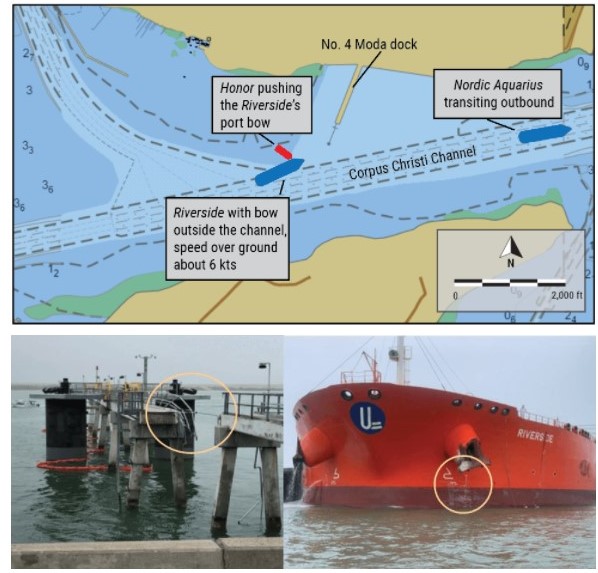NTSB published its latest report of an incident during which an incorrect solution to address a main engine start issue led to the contact between an oil tanker and a loading dock in the Port of Corpus Christi. Damage to the vessel was estimated at $550,000, while the estimated property damage to the facility was $7M. No pollution or injuries were reported.
The incident
On March 15, 2021, at 10:18, two pilots from Aransas-Corpus Christi Pilots boarded the Riverside to assist with maneuvering the vessel out of the port. The vessel carried 717,554 barrels of crude oil and was bound for Lisbon, Portugal. The vessel proceeded down the Inner Harbor section of the Corpus Christi Ship Channel at 3.5 knots with tug escorts.
Once the Riverside passed through the Harbor Bridge at 12:00, the tug escorts departed, and pilot 2 took control of the tanker and increased speed to 10.5 knots at a half-ahead bell. Pilot 2 continued outbound, and, about 1238, he became aware from radio transmissions that the tank vessel Nordic Aquarius was preparing to depart the no. 4 loading dock at the Moda Ingleside Energy Center (no. 4 Moda dock), located about 11 miles ahead of the Riverside.
At 1245, pilot 2 was informed by the pilot aboard the Nordic Aquarius that it was departing the no. 4 Moda dock. After slowing to about 6 knots, the Riverside began to sheer to port. At 1258, pilot 2 ordered the rudder hard to starboard to counteract the heading change to port, but the rudder movement had no effect on the vessel’s direction. He then ordered dead slow ahead to increase the flow of water across the rudder, which required restarting the engine in the ahead direction.
The engine failed to start from the bridge. The captain contacted the engine room, and the chief engineer tried to start the engine from the engine control room; the engine again failed to start. Meanwhile, at 1258, the Nordic Aquarius had entered the channel and was proceeding outbound.
Pilot 2 noticed that the captain was focused on adjusting the engine controls and inquired if there was a problem. The captain informed him that they had “lost the engine.” In response to that notification and realizing that the Riverside was heading toward the no. 4 Moda dock, pilot 2 contacted a nearby tug, Honor, which was standing by on the west side of the no. 4 Moda dock, and requested that the tug push on the Riverside’s port bow in an effort to clear the pier.
The tug pushed against the Riverside’s port bow and was able to affect the vessel’s direction back toward the channel, but the tug had to move out of the way to avoid becoming trapped between the pier and the vessel. Pilot 2 ordered dead slow astern, and the chief engineer tried to start the engine astern locally, but it failed to start.
At 13:02, the Riverside’s port bow struck the mooring dolphin and catwalk at the end of the no. 4 Moda dock at 5 knots. The Riverside continued past the pier, and the tug Honor maneuvered to the vessel’s stern, attached a line on the stern, and, with the assistance of the tugs Strength, America, and Courageous, stopped the vessel about 1,600 feet past the no. 4 Moda dock.
After the vessel stopped, the tugs assisted in docking the Riverside at the Flint Hills dock no. 4, a facility next to the Moda Ingleside Energy Center.

Analysis
The engine’s failure to reliably start was discovered before the Riverside entered the port of Corpus Christi, while the vessel was waiting for pilots offshore. The vessel’s chief engineer and the operating company technician evaluated the engine to determine the problem, and, after about 5 hours, the engine started when the chief engineer engaged the limit cancel mode for fuel, allowing 10% more fuel into each piston. While the engine started successfully, both ahead and astern, the cause of the engine start failure was not properly identified or corrected, leaving the engine unreliable to respond to the maneuvering demands generally encountered while transiting within a commercial port.
According to technicians from the engine’s manufacturer, the engagement of the limit cancel mode had no effect on the starting of the engine. Technicians identified that the cause of the main engine start failures was the inability of the no. 6 actuator to initiate piston rotation due to hardened grease and dirt, preventing proper movement. Following the casualty, technicians discovered other problems within several main engine systems, including the fuel pumps, the control air drying system and start air system, and numerous pneumatic air control valves.
The technicians told investigators that the engine start system failed because the vessel’s engineers did not clear moisture from the start air system by draining the air tanks on a routine basis. The chief engineer’s written standing orders required daily draining during machinery space rounds. However, based on the technicians’ assessments, it appears this routine maintenance was not regularly performed. Over time (and before the vessel arrived in Corpus Christi), this allowed hardened grease to build up in the actuator. The chief engineer stopped evaluating the engine start failure 3 days before the casualty, on March 12, after engaging the limit cancel mode on the fuel, concluding at the time that the issue was addressed.
However, engaging the limit cancel mode was not recommended by the MAN diesel operating manual as a method to start the engine, and, as stated by the diesel technicians, did not have any impact on the starting of the engine. The fact that the chief engineer left the limit cancel mode engaged—an abnormal operating condition—should have indicated that there was still an unresolved issue with starting the main engine. Had the chief engineer or the company technical representative decided to further inspect the engine or request an inspection by a diesel engine technician before the Riverside entered port, or alongside the berth before departing, the buildup on the starting air valve would have likely been identified and corrected.
Probable cause
NTSB determines that the probable cause of the contact of the tanker Riverside with the Moda Ingleside Energy Center no. 4 loading dock was the ineffective evaluation and incorrect solution for a main engine start issue by the company and shipboard engineers, overlooking the fouling of the main engine’s no. 6 air start actuator valve within the starting air distributor.
Contributing to the casualty was the presence of moisture in and lack of routine drainage of the air start system, which allowed the buildup of hardened grease within the air start actuator valve.
Lessons learned
On vessels with slow-speed diesel propulsion engines, starting and stopping main engines is a critical function for effective maneuverability. The NTSB has investigated multiple casualties involving slow-speed engine pneumatic starting and control systems and, in particular, air actuating valves within the systems.
- Vessel operators should ensure their crews are equipped with the resources and training to execute timely and thorough maintenance and repair on engines. If the root cause of an engine operating issue cannot be determined, it is critical for a chief engineer and vessel owner/operator to have a diesel technician further evaluate and determine the cause of the malfunction.
- Vessel reliability is dependent on the complete resolution of equipment malfunctions and abnormalities when they occur.






























































